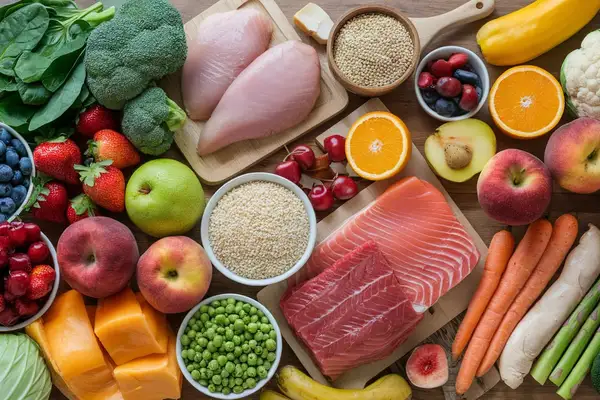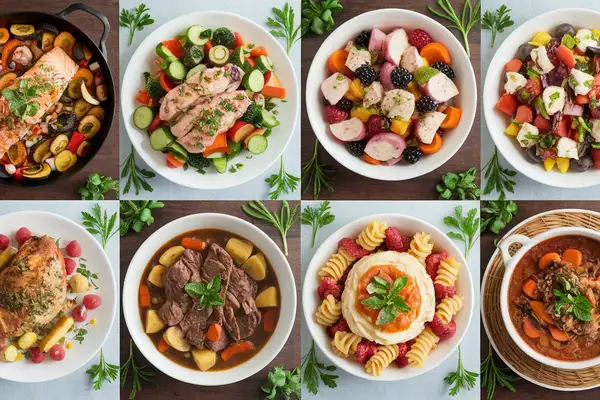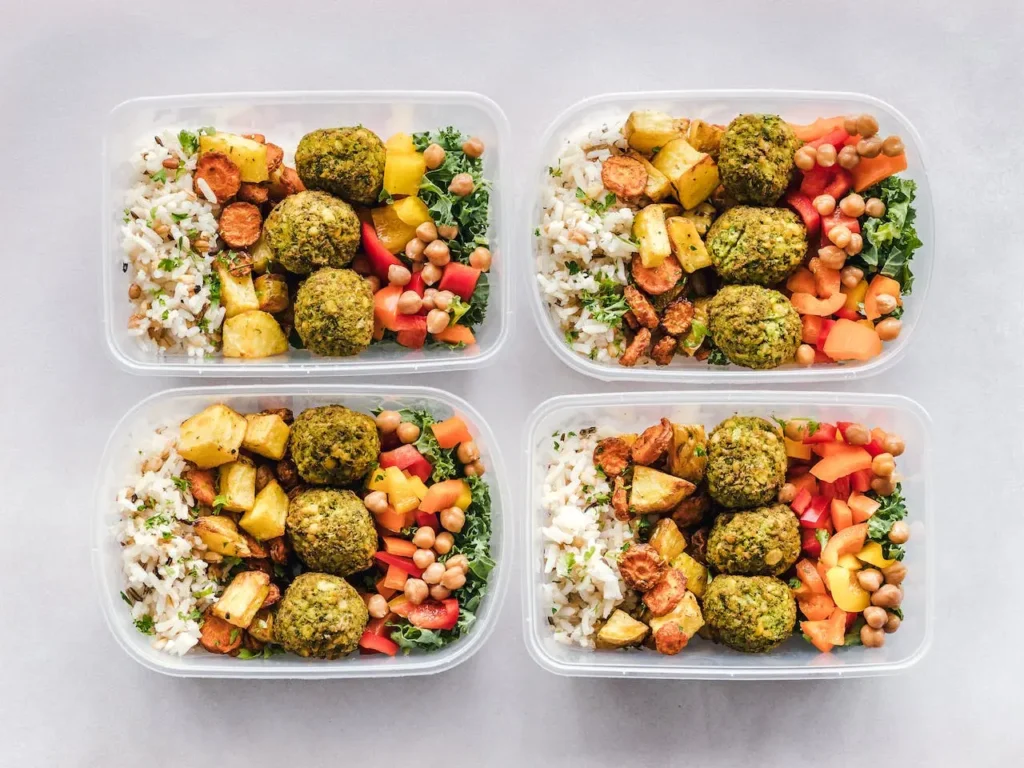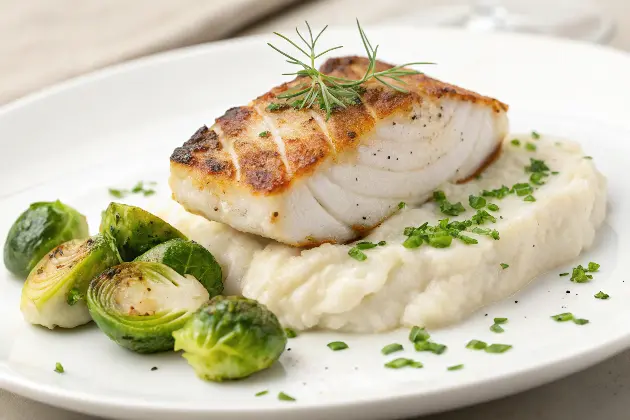7 Day Meal Plan for Gastritis: Foods to Eat and Avoid
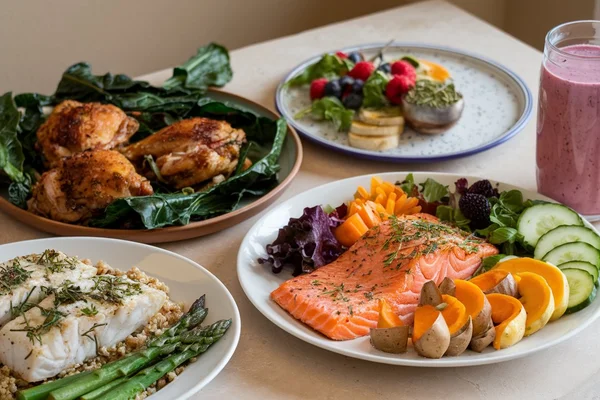
What is Gastritis?
This post may contain affiliate links, meaning I may earn a commission if you make a purchase, at no extra cost to you. I only recommend products I trust. Thank you for your support.
Gastritis is a condition characterized by inflammation of the stomach lining caused by various factors such as bacterial infections, excessive alcohol consumption, chronic use of nonsteroidal anti-inflammatory drugs (NSAIDs), or stress.
When left untreated, gastritis can lead to ulcers and other complications. Managing gastritis requires a holistic approach, and one crucial aspect is following a well-planned gastritis meal plan.
A 7 day meal plan for gastritis focuses on soothing gut healthy meals and low acid foods while avoiding trigger foods that can aggravate symptoms.
Incorporating foods to eat with gastritis, such as non-acidic fruits, lean proteins, whole grains, and healthy fats, can provide essential nutrients while minimizing potential triggers for gastric distress.
Conversely, being mindful of the foods to avoid with gastritis, including spicy foods, acidic fruits, caffeine, and alcohol, is equally vital in creating a gastritis meal plan that supports digestive wellness.
A well-balanced and nourishing diet for gastritis, individuals can proactively manage their condition and work towards alleviating symptoms through mindful meal planning and dietary choices.
Understanding the Diet for Gastritis
The diet for gastritis revolves around choosing foods that are easy to digest and gentle on the stomach.
It typically involves consuming smaller, more frequent meals throughout the day, rather than large and heavy meals.
The diet for gastritis emphasizes the inclusion of foods that reduce inflammation and soothe the stomach lining.
Some key components of the diet for gastritis include:
- Consuming lean proteins such as skinless poultry, fish, and tofu.
- Incorporating fiber-rich foods like fruits, vegetables, and whole grains.
- Opting for low-fat or non-dairy alternatives to minimize the intake of saturated fats.
- Avoiding spicy, acidic, and fried foods that can trigger symptoms.
- Drinking plenty of water and herbal teas to stay hydrated.
7 Day Meal Plan for Gastritis (Gastritis Menu)
This 7 day meal plan for gastritis emphasizes nutritious, easily digestible anti inflammatory foods, and balanced meals while avoiding known triggers for gastric distress.
Having personally faced the challenges of dealing with gastritis, I understand the struggle of finding the right foods to nourish your body while managing its symptoms.
Here is a complete 7 day meal plan for gastritis:
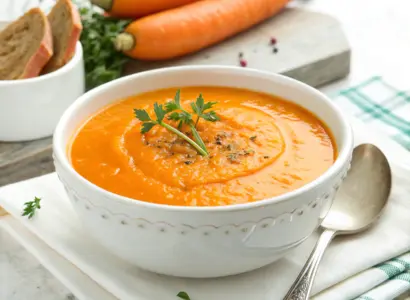
Day 1
Breakfast:
- Ginger and Turmeric Smoothie: Blend 1 cup almond milk, 1 ripe banana, 1 tsp grated ginger, 1 tsp turmeric powder, and 1 tbsp honey. Serve chilled.
- Oatmeal with Berries: Cook 1/2 cup rolled oats with 1 cup water or almond milk. Top with a handful of mixed berries and a drizzle of honey.
- Chamomile Tea: Brew a cup of chamomile tea to soothe your stomach.
Lunch:
- Carrot Soup: Sauté chopped onions and garlic in olive oil until fragrant, then add peeled and chopped carrots. Pour in low-sodium vegetable broth and simmer until carrots are tender.
- Steamed Vegetables: Steam a variety of colorful vegetables like broccoli, carrots, and bell peppers. Season with a sprinkle of sea salt and a drizzle of olive oil.
- Greek Yogurt: Enjoy a small cup of Greek yogurt for probiotics and added protein.
Dinner:
- Baked Salmon: Season a salmon fillet with dill, and a pinch of salt. Bake in the oven at 375°F for 15-20 minutes or until cooked through.
- Roasted Sweet Potatoes: Cut sweet potatoes into wedges, toss with olive oil, paprika, and garlic powder. Roast in the oven at 400°F for 25-30 minutes.
- Mixed Green Salad: Combine mixed greens, squash, cucumber slices, and a light vinaigrette dressing.
Snacks:
- Almonds: Enjoy a handful of almonds for a healthy and satisfying snack.
- Banana: Grab a ripe banana for a quick energy boost.
- Carrot Sticks: Cut carrots into sticks and dip in hummus for a crunchy snack.
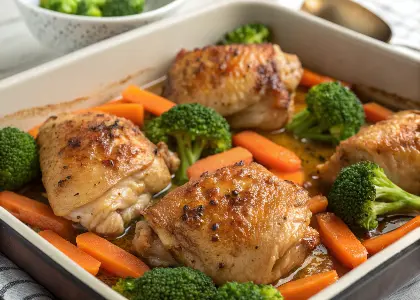
Day 2
Breakfast:
- Spinach and Mushroom Omelette: Whisk together 2 eggs, a handful of spinach, and sliced mushrooms. Cook in a non-stick pan until set.
- Whole Grain Toast: Toast a slice of whole grain bread and spread with avocado.
- Green Tea: Sip on a cup of green tea for its antioxidant properties.
Lunch:
- Lentil Soup: Cook lentils with vegetable broth, diced carrots and celery. Season with herbs and spices of your choice.
- Quinoa and Vegetable Stir-Fry: Sauté diced bell peppers, zucchini, and olive oil. Add cooked quinoa and season with soy sauce or tamari.
Dinner:
- Baked Chicken with Steamed Broccoli and Carrots: Season boneless chicken breasts with garlic powder and bake until golden and cooked through. Serve with steamed broccoli and carrots.
- Cauliflower Rice: Grate cauliflower and sauté in a pan with olive oil, garlic, and a pinch of salt.
Snacks:
- Greek Yogurt with Berries: Mix Greek yogurt with a handful of berries for a creamy and fruity snack.
- Rice Cakes with Almond Butter: Spread almond butter on rice cakes for a crunchy and satisfying treat.
- Cucumber Slices: Slice a cucumber and enjoy it as a refreshing snack.
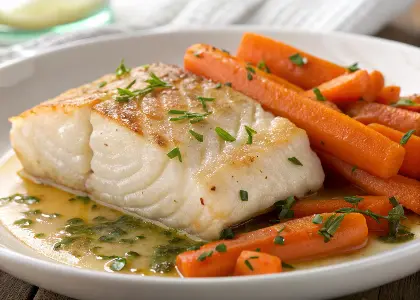
Day 3
Breakfast:
- Chia Seed Pudding: Mix 2 tbsp chia seeds with 1 cup almond milk and a dash of vanilla extract. Let it sit overnight in the fridge and top it with sliced fruits in the morning.
- Rice Cakes with Hummus: Spread hummus on rice cakes for a savory breakfast option.
- Herbal Tea: Choose a herbal tea like peppermint or chamomile to calm your stomach.
Lunch:
- Quinoa and Black Bean Salad: Combine cooked quinoa, black beans, corn kernels, and a squeeze of lime juice. Season with cumin, salt, and pepper.
- Roasted Brussels Sprouts: Toss Brussels sprouts with olive oil, garlic, salt, and pepper. Roast in the oven at 400°F for 20-25 minutes.
Dinner:
- Baked Cod with Steamed Carrots: Season cod fillets with apple cider vinegar, garlic, salt, and bake until flaky and tender. Serve alongside steamed carrots.
- Quinoa Pilaf: Sauté diced garlic, and bell peppers in olive oil. Add cooked quinoa and a handful of chopped parsley.
- Steamed Asparagus: Steam asparagus spears until tender-crisp. Drizzle with a little olive oil and sprinkle with sea salt.
Snacks:
- Rice Crackers with Salsa: Dip rice crackers in salsa for a zesty snack.
- Celery Sticks with Almond Butter: Spread almond butter on celery sticks for a crunchy and protein-packed snack.
- Kiwi Slices: Slice a kiwi and enjoy its tangy flavor as a snack.

Day 4
Breakfast:
- Overnight Oats: Mix 1/2 cup rolled oats with 1 cup almond milk and a tablespoon of honey. Let it sit in the fridge overnight. Top with sliced bananas in the morning.
- Hard-Boiled Eggs: Prepare a couple of hard-boiled eggs for a quick and protein-rich breakfast.
- Matcha Green Tea: Prepare a cup of matcha green tea for an antioxidant boost.
Lunch:
- Spinach Stuffed Chicken Breast: Butterfly a chicken breast to create a pocket, then fill with a mix of wilted spinach and a touch of garlic.
- Quinoa Tabbouleh: Combine cooked quinoa, diced cucumber, chopped mint, parsley, and olive oil.
Dinner:
- Turkey Meatballs: Mix ground turkey with diced garlic, breadcrumbs, and herbs. Form into meatballs and bake at 375°F for 20-25 minutes.
- Mashed Cauliflower: Steam cauliflower florets and mash with a little butter, garlic, and black pepper.
- Steamed Green Beans: Steam green beans until tender-crisp. Sprinkle with sea salt.
Snacks:
- Trail Mix: Combine a variety of unsalted nuts, seeds, and dried fruits for a nourishing snack mix.
- Rice Cakes with Guacamole: Spread guacamole on rice cakes for a satisfying and creamy snack.
- Pineapple Chunks: Enjoy juicy pineapple chunks for a tropical snack.
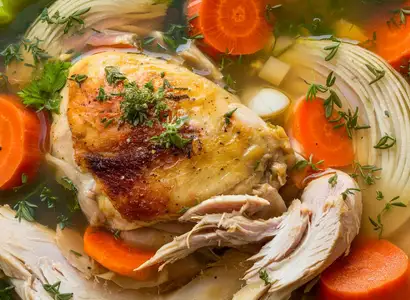
Day 5
Breakfast:
- Vegetable Omelette: Whisk together 2 eggs with diced bell peppers, spinach, and mushrooms. Cook in a non-stick pan until fluffy.
- Whole Wheat Toast with Almond Butter: Spread almond butter on whole wheat toast for a hearty breakfast.
- Peppermint Tea: Sip on a cup of peppermint tea for its soothing properties.
Lunch:
- Chickpea and Sweet Potato Stew: Sauté diced onions, garlic, and ginger in olive oil until fragrant. Add canned chickpeas (drained and rinsed), red bell pepper, and vegetable broth.
- Roasted Root Vegetables: Toss diced root vegetables like carrots, parsnips, and beets with olive oil, thyme, and rosemary. Roast in the oven at 400°F for 30-35 minutes.
- Watermelon Slices: Enjoy juicy watermelon slices for a hydrating and sweet snack.
Dinner:
- Rotisserie Chicken Soup: Simmer shredded rotisserie chicken with chopped carrots, celery, and onion in low-sodium chicken broth.
- Quinoa Stuffed Asparagus: Cook quinoa and mix with asparagus, black beans, corn, and a sprinkle of chili powder. Stuff the mixture into halved bell peppers and bake at 375°F for 20-25 minutes.
- Steamed Swiss Chard: Steam Swiss chard leaves until wilted. Drizzle with a little olive oil.
Snacks:
- Rice Crackers with Cottage Cheese: Spread cottage cheese on rice crackers for a creamy and satisfying snack.
- Edamame: Boil or steam edamame pods until tender. Sprinkle with sea salt and enjoy.
- Mango Slices: Slice a ripe mango and savor its tropical sweetness.
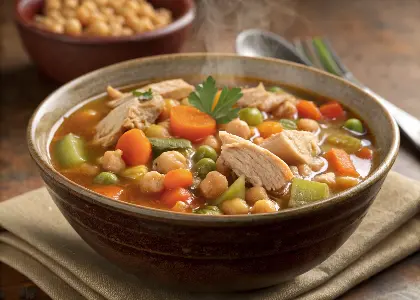
Day 6
Breakfast:
- Berry Smoothie Bowl: Blend 1 cup of almond milk, a handful of mixed berries, 1 frozen banana, and a tablespoon of almond butter. Pour into a bowl and top with sliced fruits, granola, and chia seeds.
- Whole Grain Waffles: Toast whole grain waffles and serve with a dollop of Greek yogurt and a drizzle of honey.
- Hibiscus Tea: Brew a cup of hibiscus tea for its anti-inflammatory properties.
Lunch:
- Slow-Cooker Chicken Chickpea Soup: Combine diced chicken breast, canned chickpeas (drained and rinsed), chopped carrots, celery, onion, and garlic in a slow cooker and add low-sodium chicken broth.
- Grilled Zucchini: Slice zucchini lengthwise, brush with olive oil, and grill until tender.
- Blueberries: Enjoy a handful of blueberries for their antioxidants and natural sweetness.
Dinner:
- Baked Cod with Cucumber Salsa: Top a cod fillet with homemade cucumber salsa and bake at 400°F for 15-20 minutes.
- Brown Rice Pilaf: Sauté diced garlic, and carrots in olive oil. Add cooked brown rice and a handful of chopped parsley.
- Grilled Asparagus: Grill asparagus spears until lightly charred. Drizzle with olive oil.
Snacks:
- Hummus with Bell Pepper Slices: Dip bell pepper slices in hummus for a crunchy and flavorful snack.
- Walnuts: Enjoy a handful of walnuts for their healthy fats and satisfying crunch.
- Strawberries: Savor some juicy strawberries for a burst of vitamin C.
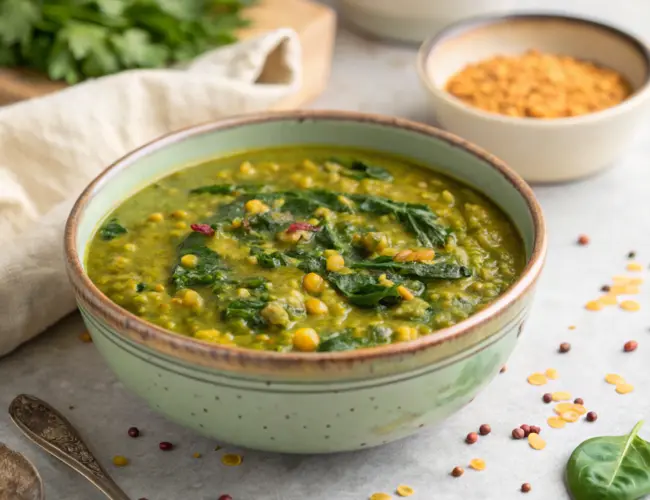
Day 7
Breakfast:
- Avocado Toast: Mash avocado onto whole-grain toast. Sprinkle with sea salt.
- Vegetable Frittata: Whisk together eggs, diced vegetables of your choice, and a pinch of salt. Bake in the oven at 375°F until set.
- Dandelion Root Tea: Brew a cup of dandelion root tea to support digestion.
Lunch:
- Dan’s Longevity Spinach Dal Soup: Simmer yellow lentils (moong dal) with turmeric and water until soft. In a separate pan, sauté garlic, ginger, and cumin seeds in a bit of olive oil, then stir in fresh spinach.
- Papaya Slices: Enjoy some juicy papaya slices for their enzymes and tropical flavor.
Dinner:
- Grilled Shrimp Skewers: Marinate shrimp in garlic, and herbs. Thread onto skewers and grill until pink and cooked through.
- Baked Sweet Potatoes: Bake sweet potatoes in the oven at 400°F for 45-50 minutes or until tender. Serve with a dollop of Greek yogurt.
- Sautéed Spinach: Sauté spinach leaves with garlic and a drizzle of olive oil until wilted.
Snacks:
- Cucumber Salad: Toss diced cucumbers with a drizzle of extra virgin olive oil and a pinch of Himalayan pink salt or sea salt.
- Pumpkin Seeds: Enjoy a handful of pumpkin seeds for their magnesium and zinc content.
- Raspberries: Snack on some raspberries for their antioxidants and tart flavor.
Foods to Eat With Gastritis
These foods are generally considered gentle on the stomach and can help alleviate discomfort associated with gastritis.
However, individual tolerances may vary, so it’s essential to pay attention to how specific foods affect one’s symptoms and make adjustments accordingly.
Here’s a list of the generally recommended foods to eat with gastritis:
1. Non-acidic Fruits
- Bananas
- Melons
- Peaches
- Pears
- Applesauce
2. Non-cruciferous Vegetables
- Carrots
- Green beans
- Potatoes
- Spinach
3. Lean Proteins
- Skinless poultry
- Fish like salmon and cod
- Tofu
- Lean cuts of beef or pork.
4. Whole Grains
- Oatmeal
- Brown rice
- Quinoa
- Whole grain bread
- Whole grain pasta
5. Healthy Fats
- Olive oil
- Avocados
- Nuts (in moderation)
6. Low-fat or non-fat dairy products
- Yogurt
- Milk
- Cheese
7. Herbs and Spices
- Ginger
- Turmeric
- Fennel
8. Beverages
- Water
- Herbal teas
- Low-acid fruit juices (diluted with water if too acidic)
9. Probiotics
- Fermented foods like yogurt and kefir containing probiotics
Foods to Avoid With Gastritis
Avoiding these foods can help minimize irritation to the stomach lining and reduce the likelihood of triggering gastritis symptoms.
Here is a list of foods to avoid for individuals dealing with gastritis:
1. Spicy Foods
- Hot peppers
- Chili powder
- Spicy seasonings
- Excessive amounts of black pepper
2. Citrus Fruits
- Oranges
- Lemons
- Grapefruits
3. Tomatoes and Tomato-based Products
- The high acidity in tomatoes can be harsh on the stomach, making them best avoided for those with gastritis.
4. High-Fat Foods
- Fried foods
- Fatty cuts of meat
- Dairy rich products
5. Carbonated Drinks
- Soda (Cola, Lemon-Lime, Orange, Root Beer, etc.)
- Sparkling Water (Plain, Flavored)
- Club Soda
- Tonic Water
- Ginger Ale
- Ginger Beer
- Energy Drinks (e.g., Red Bull, Monster, Rockstar)
- Carbonated Fruit Juices (e.g., Sparkling Apple Juice)
- Carbonated Iced Tea
- Flavored Seltzer Water
6. Alcohol
- Beer
- Wine
- Spirits
- Liqueurs
7. Caffeine
- Coffee (e.g., Espresso, Americano, Latte, Cappuccino, Mocha)
- Tea (e.g., Black Tea, Green Tea, White Tea, Oolong Tea, Herbal Tea)
- Energy Drinks (e.g., Red Bull, Monster, Rockstar)
- Soft Drinks with Caffeine (e.g., Coca-Cola, Pepsi, Mountain Dew)
- Iced Tea (Sweetened or Unsweetened)
- Chai Tea
- Matcha Tea
- Yerba Mate
- Coffee-Based Beverages (e.g., Cold Brew, Iced Coffee, Frappuccino)
- Flavored Water with Caffeine (e.g., Sparkling Water with Added Caffeine)
- Chocolate
8. Mint
- Peppermint
- Spearmint
9. Processed Foods
- Highly processed snacks
- Fast food
- Packaged meals high in preservatives and additives
10. Artificial Sweeteners
- Sorbitol
- Mannitol
- Xylitol
- Maltitol
- Erythritol
- Isomalt
- Lactitol
Benefits of a Gastritis Meal Plan
Following a 7 day meal plan for gastritis can provide several benefits that contribute to your overall well-being.
By embracing a gastritis meal plan for gut health, you can improve your digestive health and quality of life.
Here are some key benefits of a gastritis meal plan:
- Digestive Comfort: By including easily digestible and gut healthy foods in the gastritis meal plan, individuals can promote digestive comfort and reduce the likelihood of experiencing gastric distress.
- Nutritional Balance: A well-designed 7 day meal plan for gastritis meal plan ensures that individuals with gastritis receive essential nutrients from a variety of food groups, supporting overall health and wellness.
- Symptom Management: A well-structured gastritis meal plan can help manage the symptoms of gastritis such as abdominal pain, bloating, and heartburn by emphasizing foods that are gentle on the stomach and minimizing those that may trigger discomfort or irritation.
- Weight Management: Following a 7 day meal plan for gastritis vegetarian can help you maintain a healthy weight or achieve weight loss if necessary. Excess weight can put pressure on the stomach and worsen gastritis symptoms.
- Reduced Irritation: Avoiding foods that are known to exacerbate gastritis symptoms can help reduce irritation to the stomach lining, potentially leading to a decrease in inflammation and discomfort.
- Promotion of Healing: Certain foods included in the gastritis meal plan, such as those rich in antioxidants and anti-inflammatory properties, can support the healing process of the stomach lining.
Lifestyle Changes to Help You Manage Gastritis
In addition to following a 7 day meal plan for gastritis, certain lifestyle changes and supplements can further promote gastritis relief.
Consider the following lifestyle changes to supplement your gastritis diet plan:
- Stress Management: Engage in stress-reducing activities such as yoga, meditation, or deep breathing exercises.
- Regular Exercise: Engage in moderate exercise, such as walking or swimming, to improve digestion and reduce inflammation.
- Probiotics: Consider taking a probiotic supplement or consuming fermented foods to promote a healthy gut microbiome.
- Herbal Remedies: Some herbs, such as ginger and licorice root, have anti-inflammatory properties that can soothe the stomach.
- Sleep Schedule: Prioritize getting enough sleep and establish a regular sleep schedule to support overall wellness.
- Smoking Cessation: If you smoke, consider quitting or reducing smoking as it can worsen gastritis symptoms.
Resources
Gastritis Relief Cookbook: A comprehensive cookbook with gastritis-friendly recipes and meal plans. Buy on Amazon.
Gastritis Dietitian Services: Personalized nutrition counseling and meal planning services specifically tailored to individuals with gastritis.
Conclusion
Living with gastritis can be challenging, but by adopting the 7 day meal plan for gastritis in this article, you can significantly improve your quality of life and promote healing.
By selecting gut healthy foods, avoiding triggers, and following a structured eating pattern, you can effectively manage gastritis symptoms and support the healing process.
Remember to consult with a healthcare professional to personalize your meal plan based on your specific needs and preferences.
With dedication and the right approach to a gastritis meal plan or gastritis diet, you can nourish your body, alleviate gastritis symptoms, and cultivate a healthier lifestyle.
Don’t let gastritis hold you back from living your best life – start your journey to relief and healing today!
- 10 delicious and healthy vegetarian breakfast ideas
- Foods to eat after gastric bypass surgery
- 7-day low glycemic diet
- Top 10 alkaline foods
- High fiber meal plan
- Keto diet meal plan
- Soft foods to eat after dental surgery
- 7-day meal plan for ulcerative colitis
- 7-day gluten-free meal plan.
- 7-Day Meal Plan for Kidney Disease
- 7-Day Meal Plan for Pancreatitis Recovery
- 7-day meal plan for seniors
- Diabetic meal plan
- Foods to avoid while taking trulicity
- 7-day low sodium diet meal plan
- Foods to avoid if alkaline phosphatase is high
- 7-day meal plan for low potassium diet
- Check out moringa’s healthy benefits for men
- 7-day meal plan for pregnant women
- 5-day menopause diet plan to lose weight
Frequently Asked Questions (FAQs)
Are there any specific foods I should avoid if I have gastritis?
Yes, these include spicy foods, acidic foods and beverages (like citrus fruits and coffee), fried and fatty foods, and carbonated drinks.
How long should I follow a 7 day meal plan for gastritis?
The length of time you follow a 7 day meal plan for gastritis will depend on the severity of your gastritis and your individual needs. Some people find relief within a few weeks, while others may need to follow the plan for a longer period.
Can I drink coffee while following a gastritis meal plan?
No, It’s best to avoid or limit coffee consumption as it can irritate the stomach lining while following a gastritis meal plan. Consider switching to herbal teas or decaffeinated alternatives.
What is a good diet for gastritis?
A good diet for gastritis includes eating small, frequent meals with foods that are easy on the stomach, such as non-acidic fruits, vegetables, lean proteins, whole grains, and low-fat dairy while avoiding spicy, acidic, fried, and fatty foods.
Is Yakult good for gastritis?
Yes, Yakult is a fermented dairy drink containing probiotics, which can be beneficial for digestive health. Some people with gastritis find that probiotic-rich foods like Yakult help improve their symptoms, while others may experience discomfort.
Disclaimer: The 7 Day Meal Plan for Gastritis provided here is for informational purposes only and is not intended as medical advice.
Always consult with a qualified healthcare professional before making any changes to your diet, especially if you have a medical condition such as gastritis.
